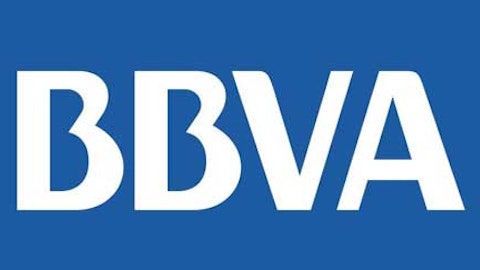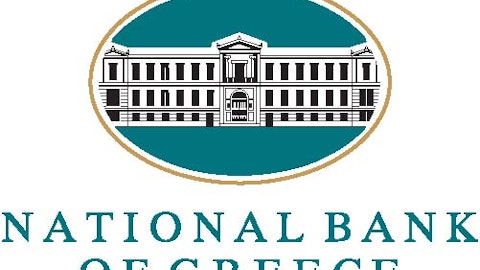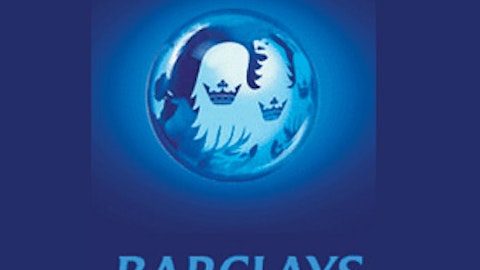Over the past couple of months, the quasi-private National Bank of Greece (ADR) (NYSE:NBG) has been engaged in a complex, high-stakes restructuring plan that could significantly affect the price of its U.S.-traded ADRs. In late April, the bank received final approval from its shareholders to execute a share offering worth nearly 10 billion euros or $13 billion. The offering was open to any investors who held the company’s shares on May 24, 2013.
In theory, the offering held out the chance for investors to earn a substantial arbitrage premium. Indeed, certain quick-footed investors were able to secure a premium of as much as 40 percent within the span of a week. Although the window of opportunity for such a premium has now closed, investors may have other ways to play this still-fresh recapitalization plan. While it is crucial to note that the National Bank of Greece remains a highly speculative stock that continues to be at the mercy of “on the ground” conditions in Greece, these plays could prove to be quite lucrative.
National Bank of Greece: Any Valid Comparisons?
Due to its unusual structure and extremely poor financial health, the National Bank of Greece (ADR) (NYSE:NBG) has few peers. Many of the banks that most closely adhered to its business model and asset mix have collapsed or been subsumed into healthier institutions. However, it is still possible to compare the bank against other financial institutions that do business in peripheral Eurozone economies. Spanish credit giant Banco Santander, S.A. (ADR) (NYSE:SAN) and Italy’s Mediobanca SpA both fit this bill.
National Bank of Greece (ADR) (NYSE:NBG) is held in much lower esteem by its investors. The $685 million market capitalization of the firm’s American shares is a far cry from Mediobanca’s $4.2 billion market cap and Banco Santander, S.A. (ADR) (NYSE:SAN)’s $72 billion valuation. Despite poor financial health across the sector, NBG is also considerably less profitable than its peers. In 2012, it posted a jaw-dropping loss of $1.8 billion on total revenues of just over $1.8 billion. In other words, it posted a profit margin of minus 100 percent. By contrast, Santander earned $2.3 billion on revenues of just under $34 billion. Mediobanca managed a profit of just over $13 million on revenues of around $875 million.
Although National Bank of Greece (ADR) (NYSE:NBG) has substantial cash reserves of more than $15 billion, its debt load hovers just below $52 billion. To make matters worse, its cash flow sits at an appalling minus $5.4 billion. With $41 billion in debt to $15 billion in cash, Mediobanca has a more manageable debt ratio. Santander’s debts of $420 billion compare favorably to a cash hoard of over $480 billion.
The Recapitalization Plan’s Basic Structure
National Bank of Greece (ADR) (NYSE:NBG)’s restructuring plan is essential to its survival as an independent entity. It consists of two basic parts. The first involved a 10-to-1 reverse split that occurred over the span of a one-week trading halt in late May. This caused the company’s American share price to “jump” from about $1.20 before the split to $12.20 after the split.
Thanks to the second component of the restructuring plan, the company’s stock price did not stay at these levels for long. This step involved the issuance of warrants to purchase the company’s new shares at about 4.3 euros per share. At current exchange rates, this translates to a buy-in price of $5.50 per American share.
What Has Happened so Far?
This opportunity was only available to investors who held National Bank of Greece (ADR) (NYSE:NBG)’s stock before the split. If NBG meets a self-imposed target to increase its capitalization by 12 percent through the share offer, these warrants will offer their holders the chance to buy additional NBG shares from the Hellenic Financial Stability Fund at a ratio of 7.33-to-1. At this point, it is unclear whether the 12 percent target has been met.
However, it is clear that NBG’s stock price has suffered since the split. Although this was to be expected, it has wiped out the arbitrage premium that was available to pre-split shareholders.
Long-Term Outlook and Best Moves
Since exchange-rate fluctuations will partially dictate the movement of National Bank of Greece (ADR) (NYSE:NBG)’s U.S.-traded shares in the coming months, it may make more sense for investors to reduce their exposure to volatility by purchasing NBG’s Greece-traded shares. However, investors who wish to play this situation should exercise extreme caution. NBG is an “experts-only” stock that is wildly volatile and subject to many complex market forces. Although it is probably a necessary step that should further increase the strength of its capital reserves, the recent announcement that NBG would buy back most of its U.S.-listed preferred shares at a 50 percent discount must be seen as extremely disappointing. In the near term, this move may put further downward pressure on the company’s stock price and reduce the possibility of quick gains.
Overall, National Bank of Greece (ADR) (NYSE:NBG) is a risky name that continues to deal with serious structural problems. Although its intra-day volatility may offer some opportunities for sure-footed investors, there is no longer a reliable arbitrage opportunity at play here. Likewise, NBG’s long-term prospects look murky. While the company’s stock price could recover over the next few months, it might take some time to digest the recent reverse split. Investors who wish to gain exposure to this situation should take steps to protect themselves before doing so.
Mike Thiessen is short NBG stock, short June 21 NBG $6 Puts, and long June 21 NBG $6 Calls. The Motley Fool has no position in any of the stocks mentioned. Mike is a member of The Motley Fool Blog Network — entries represent the personal opinion of the blogger and are not formally edited.
The article Recapitalization Plan Sows Confusion but May Offer Big Profits originally appeared on Fool.com and is written by Mike Thiessen.
Copyright © 1995 – 2013 The Motley Fool, LLC. All rights reserved. The Motley Fool has a disclosure policy.





